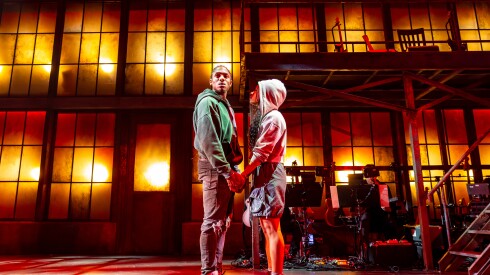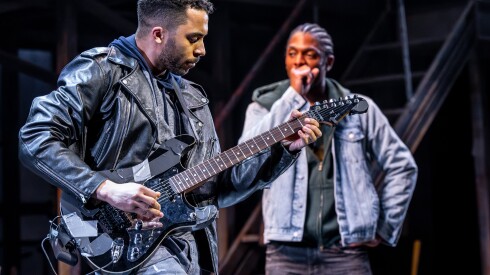Boasting a score from the catalog of Tom Morello of Rage Against the Machine and Audioslave fame, the new musical “Revolution(s)” at Goodman Theatre bursts with an authentically rebellious musical spirit.
When the high-caliber cast and onstage band break out into Morello’s propulsive hybrid of hip-hop and heavy metal, they channel a mix of anger, anarchic independence and hope that is an ideal sound for this moment. It’s timely that a show about political resistance set in Chicago is opening as our neighbors are stepping out of their houses to defend their communities from masked federal authorities who are delivering fear more than order.
Unfortunately, “Revolution(s)” ultimately comes off as a work more at war with itself than with
authoritarian creep or social injustice. What sounds like a show perfectly timed to the moment turns out to be the opposite.
The script here is from Zayd Ayers Dohrn, who teaches playwriting at Northwestern University and is the son of famed leaders of the late ‘60s and early ‘70s militant group Weather Underground. He knows about American revolutionaries, at least those from another generation. But while Morello’s music throbs with a communal fury, Dohrn’s play sits in high contrast. It feels extremely personal, an artist’s individual churning over of familial demons, and not a meaningful take on responding to systemic wrongs.
Dohrn tells two stories simultaneously. One is set in 1989 as a memory play about how African-American veteran Leon (Al’Jaleel McGhee) and his anti-establishment wife Emma (Jackie Burns) ended up on the run from the law with their newborn twin sons. The yarn does not appear to draw so much from the Weather Underground (it’s the ‘80s!) as it’s a mash-up of Bonnie and Clyde and Robin Hood.
The other plot line, set in 2016, traces those now-grown twins. Hampton (Aaron James McKenzie) seems to be following in the footsteps of his father. He enlisted, very much against the urgings of both his mother and his undocumented girlfriend, Lucia (Alysia Velez). He served in Afghanistan and at the start escapes from what appears to be a mental hospital, returning to the South Side of Chicago filled with a fierce but undefined desire to rebel.
His casual, thoughtless tossing of a bottle toward police sets off a predictable chain of events that ends up involving Lucia and his brother, Ernie (Jakeim Hart). While Hampton served in the Army, Ernie has quietly become an ace guitarist (a la Morello). But he has retreated fully into himself, either resigned that an individual can’t make a difference or just not caring to.
It isn’t clear at all why Dohrn has chosen 1989 and 2016. The latter story would make more sense set in 2020 during the protests following the police killing of George Floyd. It’s a problem overall. Without a clear connection to a specific historical moment, there’s a poetic-allegorical vagueness, one echoed in the show’s marketing materials yet not in director Steve H. Broadnax III’s fluid, relatively realistic production.
The songs — mostly played by the musician characters — don’t advance the narrative or integrate into the storytelling. But the biggest problem here is that the music’s pure, righteous fury doesn’t mesh with a tale that becomes an emotionally unnavigable moral thicket. Usually, moral ambiguity and complexity would be an artistic strength. But here, Dohrn employs a series of thematic threads that do battle with each other as much as they fight the music’s concentrated emotion.
On the one hand, this story strives toward a familial healing as Leon tries to impart the truth of his past. But it also takes the audience on a tragic trajectory that resembles Sophocles’ Oedipus Cycle, the story of a son seeking to escape the fate set by his father while heading right for it the entire way. Oddly, it suggests that rebellion is an inherent individual character trait, not a response to societal wrong.
And the innocent Ernie’s story ends as if the show needs a moral for its fable, that everyone must do what they can, including artists writing works of protest. While true enough, it comes off as a cloying self-congratulatory pat on the back.
There’s no shortage of talent here, and the musical moments are so compelling that it’s easy to root for this show to find a way forward. It can, but it requires a major reconsideration of what it’s trying to express. The play should take its cue from Morello’s songs, and from what’s happening in the streets right now, and allow for resistance to be put forth with moral clarity rather than strained complexity.

